20 Marcus Aurelius Quotes on Death and the Art of Living
Marcus Aurelius on Death
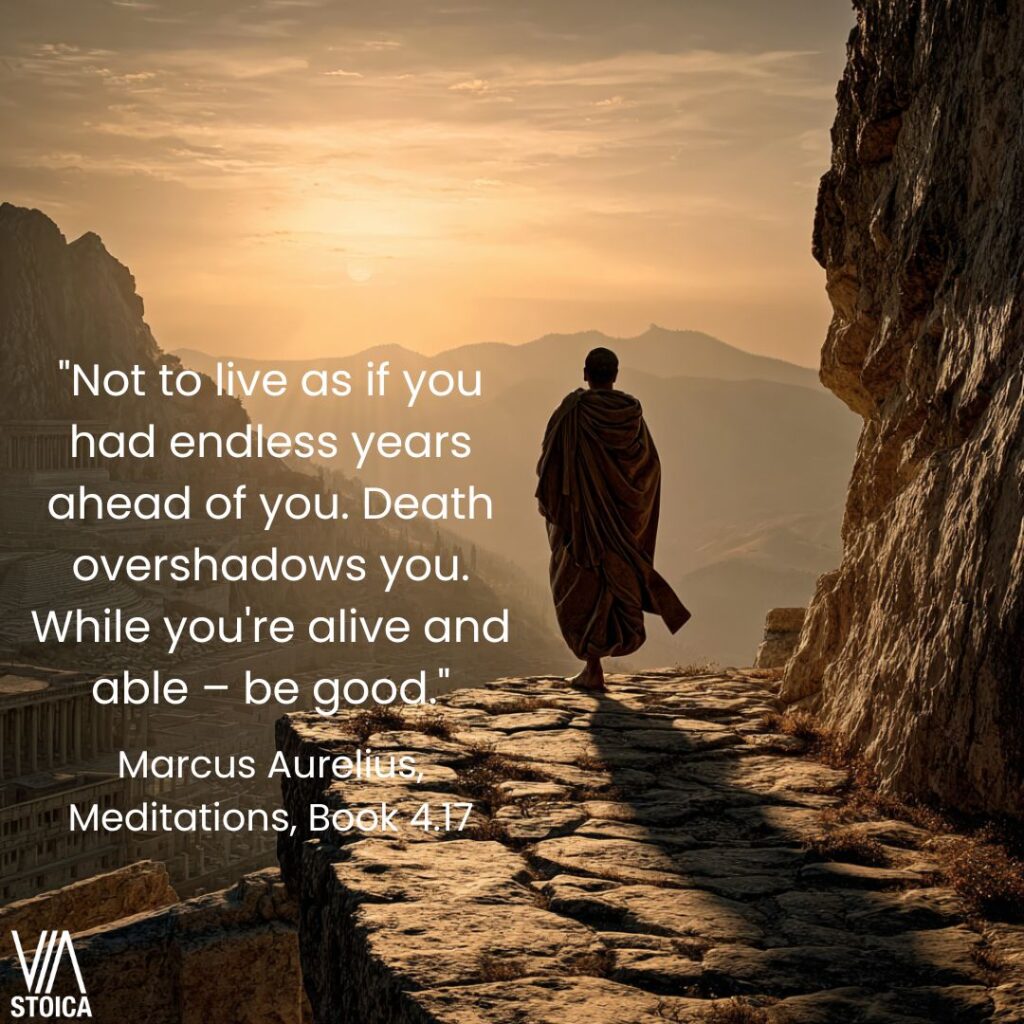
Most people live as if death is distant, but for Marcus Aurelius, it was always on his mind, and these 20 quotes will show that. For the Stoics, death is not something to be feared or avoided; it’s something to prepare for. Marcus Aurelius, Roman Emperor and philosopher, reminds us in Meditations that death is not an interruption to life but a natural and integral part of it.
When reading these quotes and their reflections, it is important to keep in mind that these come from the personal and private journal of Marcus Aurelius. They were never meant to be published, and these are his thoughts. You can learn more about his life here: Who Was Marcus Aurelius?
For more Marcus Aurelius Quotes, go here.
By meditating on death and learning to accept or even embrace it, we live more fully. We stop wasting time. We let go of petty worries. And we begin to act with integrity, not later, but now.
Here are 20 authentic quotes by Marcus Aurelius on death, each with a reflection and a practice to bring these insights into your daily life.
Accepting the Presence of Death
- Live Before You Die
“Not to live as if you had endless years ahead of you. Death overshadows you. While you’re alive and able – be good.”
Marcus Aurelius, Meditations, Book 4.17
Reflection:
So many of us live as if we are immortal and have all the time in the world. Yet we forget that death, as Marcus tells himself, overshadows us. It is this reminder that tells us that we have to make the best of the time that we have. For a Stoic, that means to live it well, using reason and logic to apply virtue.
That’s why the ending of this quote is so powerful, as Marcus Aurelius tells himself to be good. This is something we can all do. No matter what the external circumstances are, we can still be good. And we shouldn’t wait to start being good; we should do that right now.
Practice:
Write down three ways you can be “good” today. Then do them.
- Memento Mori
“You could leave life right now. Let that determine what you do and say and think.”
Marcus Aurelius, Meditations, Book 2.11
Reflection:
This could be your last breath, the last time you went to sleep, or the last time you saw your loved ones. These reminders aren’t meant to be morbid, although this is something that a lot of people often think of first. It’s that second part of this quote that packs the true meaning.
By understanding that all of this can be gone the next moment, we should be grateful and appreciative that we are here now. We should enjoy the time we get to spend with our loved ones and experience life. These externals aren’t good by themselves; it’s how we relate to them. If we give them our attention and learn to be virtuous around them, then they will make our lives good.
Practice:
Start your morning by saying, “I may not finish this day. So let me live it well.”
- You’ve Already Lived
“Think of yourself as dead. You have lived your life. Now take what’s left and live it properly.”
Marcus Aurelius, Meditations, Book 7.56
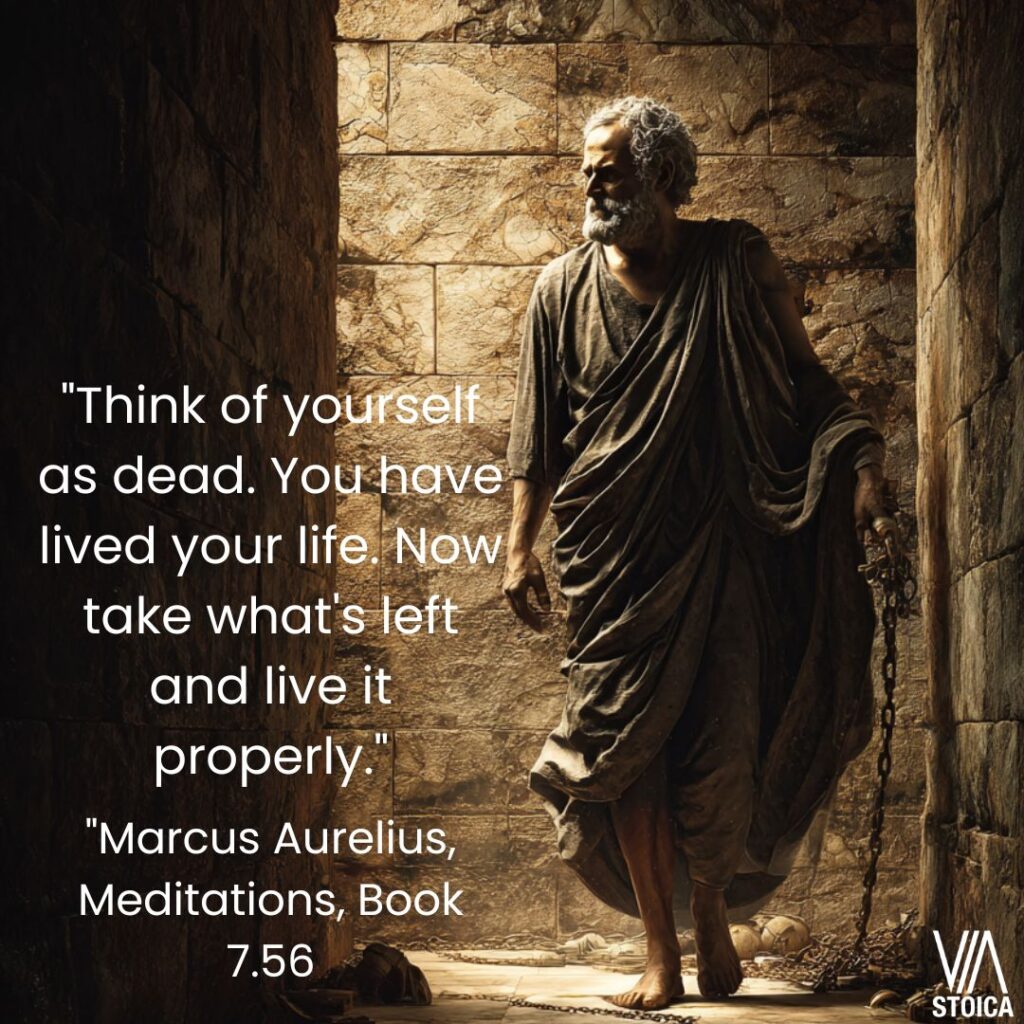
Reflection:
Instead of trying to prolong life, cheat death, or try to avoid it, think of yourself as dead already. Take the sting out of it and start living properly, as Marcus Aurelius tells himself. What he means by thinking of yourself as dead is that this moment will soon be gone, and that’s all that we can lose. Whether we get another moment is uncertain.
But we have this moment, that is what is left, and let’s make sure to make the most of it. How you do that is up to you, by following reason and logic and not external forces. Learn to listen to yourself and understand what it is that you need to do to give your life meaning.
Practice:
End your day with this question: Did I live today like it was a second chance?
- Give It Up Without Complaint
“To pass through this brief life as nature demands. To give it up without complaint.”
Marcus Aurelius, Meditations, Book 4.48
Reflection:
If we learn to live as nature has given life to us, by being rational beings, we can see how wonderful it is. All the obstacles will turn into tests and ways to practice being virtuous. And if we manage to apply virtue in all of these situations, we can experience joy and Eudaimonia, the Stoic goal.
When death meets us, and if we live well, then we can let it go without complaint and in peace. With the knowledge that we did it well and that even in this moment, we need to apply virtue. If it is natural to happen, then how can it be a bad thing? Say our farewells and exit with grace.
Practice:
When something ends today, a moment, a task, a conversation, practice saying, “Thank you. I release it with gratitude.”
Death as Part of Nature
- Welcome It
“Don’t look down on death, but welcome it. It too is one of the things required by nature.”
Marcus Aurelius, Meditations, Book 9.3
Reflection:
How can we welcome death when it means the end of our existence? As we go through these 20 Marcus Aurelius quotes on death, we will learn to see that there is no other way to approach it. If we fear or reject it, we can never experience life as it was meant to be. The two go hand-in-hand.
By learning to embrace or welcome it, we meet it with a positive mindset and not as something that is evil. It will give us time to prepare for the moment and practice meeting it. We can remind ourselves of this fact every time we go to sleep and reflect on how well we spent the day. A Stoic will meet death with joy if it is done virtuously.
Practice:
When the thought of death comes, say: “You too belong and I welcome you.”
- Nothing to Be Afraid Of
“What dying is – and that if you look at it in the abstract and break down your imaginary ideas of it by logical analysis, you realize that it’s nothing but a process of nature, which only children can be afraid of.”
Marcus Aurelius, Meditations, Book 2.12
Reflection:
Ask yourself what it is that you fear about death. Make it as specific as possible. Is it the pain you might feel, the uncertainty of what lies beyond, or giving up life? Now, try to apply logic as best as you can to examine these thoughts. If it’s the pain, then it will be temporary. If you lived well, then whatever happens after is nothing to worry about. And giving up life is a natural part. Life itself is always preparing us for this ultimate goodbye by letting us experience loss at every moment.
Practice:
Visualize your fears of death, talk about them, and examine them. Don’t let them grow in your imagination; try to grasp their essence. If you struggle with this and would like some help, you can book a free consultation with one of our coaches to talk about this.
- If It Were Harmful, Nature Would’ve Warned Us
“If there were anything harmful on the other side of death, they would have made sure that the ability to avoid it was within you.”
Marcus Aurelius, Meditations, Book 2.11
Reflection:
Marcus Aurelius keeps reminding himself that death is natural and not a bad thing. He refers to the gods here, which the ancient Stoics used the same as nature or the rational universe. And because nature is pure logic and reason and nothing bad, death is also just one more moment of change.
If it had been something bad, then we would be able to avoid it, and we would see people live as immortals. Having achieved the solution to circumvent dying. But since we see everything around us drop out of existence, so too must we.
Practice:
Notice something dying in nature today, a leaf, a fruit, a cloud. See its quiet wisdom.
- What Happens at Death
“The condition of soul and body when death comes for us.
Marcus Aurelius, Meditations, Book 12.7
– Shortness of life
– Vastness of time before and after
– Fragility of matter”
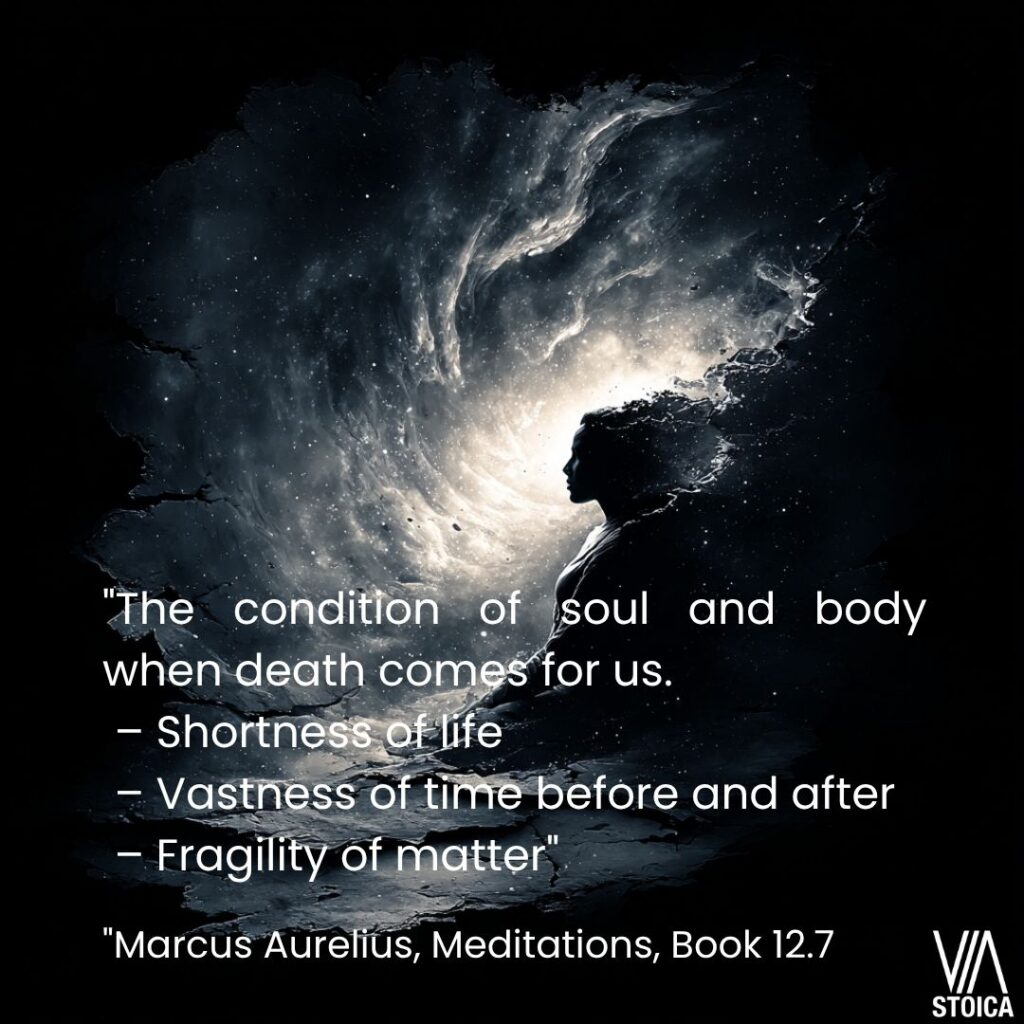
Reflection:
Marcus invites us to reflect not on death emotionally, but analytically. Time stretches infinitely beyond us. Life is brief. Matter is fragile. He uses a few techniques here to help give him perspective. One is zooming out and looking at it from a bigger perspective by reflecting on the eternal time before and after our existence, in which we are not alive. This little speck in time we occupy is trivial to the grand scheme of things, and yet we are here now to make the most of it.
Practice:
Sit silently and visualize this: a short flicker of flame in an eternal dark field. That is life.
- End of the Body’s Rule
“Death, the end of sense-perception, of being controlled by our emotions, of mental activity, of enslavement to our bodies.”
Marcus Aurelius, Meditations, Book 6.28
Reflection:
We experience life through our senses; the Stoics were aware of this. We feel, taste, touch, see, and hear the world around us. This we use to decide what we should do in life. But when we die, those sense-perceptions, as Marcus puts it, will be gone.
We will be set free, and with that, he means our soul, the pneuma we carry. Our body will be dissolved in nature, and our soul will be too. With that comes the responsibility to take care of our soul and return it in the best possible state, a peaceful and eudaimonic one.
Practice:
Appreciate the body today without identifying with it. You are more than the vessel.
Impermanence and the Passing of All Things
- You Will Be Forgotten
“Close to forgetting it all, close to being forgotten.”
Marcus Aurelius, Meditations, Book 7.21
Reflection:
A lot of people are living for their legacy, for what they leave behind. And in doing so, they sacrifice experiencing life in the present. The problem with this approach is that they will not be aware of what legacy they will leave behind, and whether it is what they had in mind. Moreover, even that legacy will, at one point, be forgotten. Just go far enough into the future.
We will forget about all of this, as we have with many things already, and so we will be forgotten at one point. It is ironic for Marcus Aurelius to tell himself this because if anyone is not even near to being forgotten, almost 2000 years after his death, then it is he. But he realized that at one point he will be.
Practice:
Let go of one thing today done for image or legacy. Do something kind in silence.
- Ashes and Echoes
“Soon you’ll be ashes, or bones. A mere name, at most – and even that is just a sound, an echo. The things we want in life are empty, stale, and trivial.”
Marcus Aurelius, Meditations, Book 5.33
Reflection:
All that we desire and chase will be gone at one point, and in the end, we will be gone. We cannot bring any of it with us, wherever we go. Here, Marcus, who had access to more riches than anyone can imagine, reminds himself how little it all means. He turns to the Cynic foundation of Stoicism. The only good is virtue; all the externals are meaningless.
So think about your own life. What is it that you are chasing or trying to obtain? What does that mean, and how does it add to a good life? In Stoicism, only one thing matters, and that is what is up to you, your choices to apply reason and virtue. By following this, you can live a fulfilled and meaningful life.
Practice:
Ask: What am I clinging to today that will mean nothing when I die?
- No Advantage in Longevity
“All that you see will soon have vanished, and those who see it vanish will vanish themselves, and the ones who reached old age have no advantage over the untimely dead.”
Marcus Aurelius, Meditations, Book 9.33
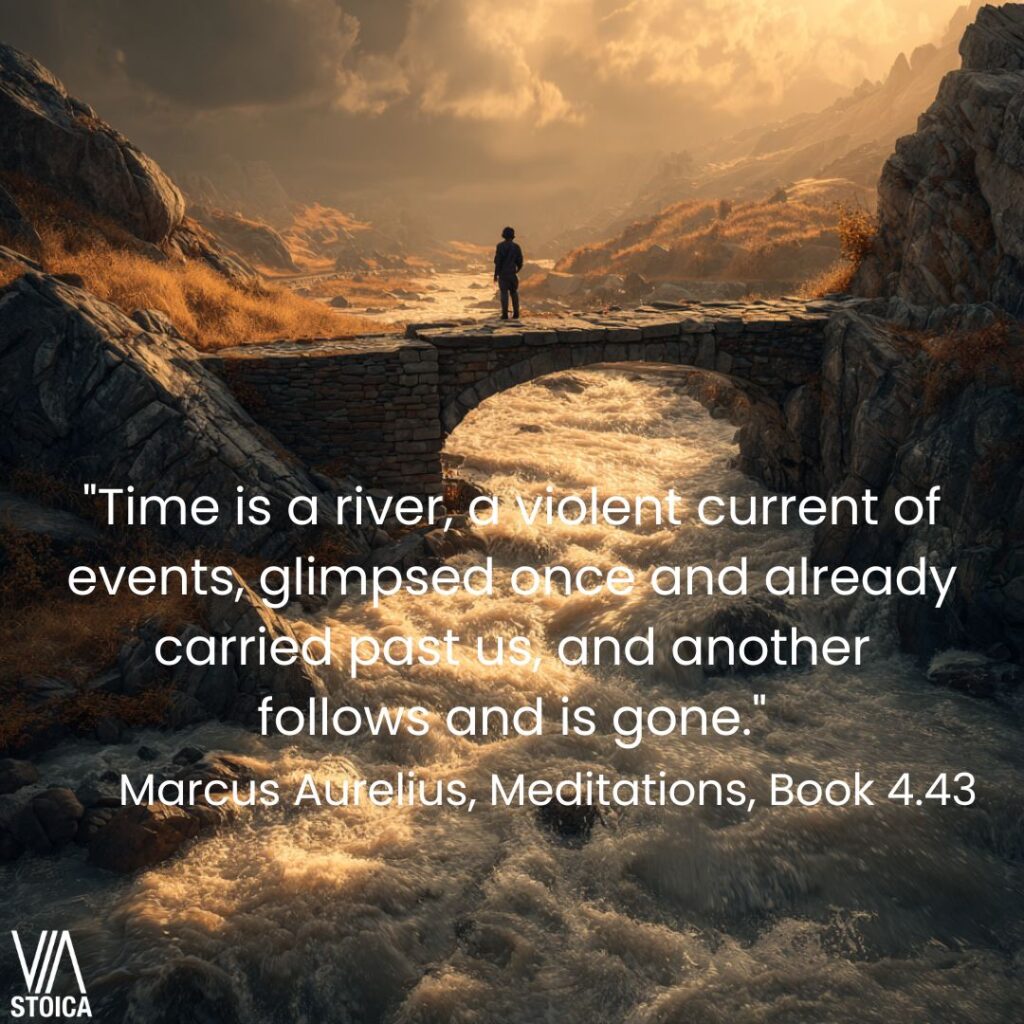
Reflection:
There are many recurring topics in these 20 Marcus Aurelius quotes on death, and that’s because it is on the Emperor’s mind. He struggles with it. the same way we do. But this is his preparation to meet his end, and we should follow his example.
He has seen Emperors die, a plague wreaks havoc in the Roman Empire, and wars cause death and destruction. He knew all too well that even his empire would at one point fall. Just as our civilization will cease to exist at one moment in time. That’s what he is reminding himself of here. Change will take care of it, as our lives are just a small part of it.
Practice:
Count the meaningful moments today, not the hours.
- Everything Is Passing
“Time is a river, a violent current of events, glimpsed once and already carried past us, and another follows and is gone.”
Marcus Aurelius, Meditations, Book 4.43
Reflection:
Time passes by so fast that it seems to be gone within a blink. And before we can open our eyes, the next moment is there. Time to adjust is almost never given to us. It is the impermanence of nature in which we have to swim along.
The Stoics remind us that we need to learn to accept this constant flow of change and go with it. We are floating towards the vast sea in which we will dissolve, so let’s make the most of the ride. If we resist, it will be a long and torturous journey with the same end.
Practice:
Notice what has already passed today, and let it go.
- Transitory
“Everything transitory – the knower and the known.”
Marcus Aurelius, Meditations, Book 4.35
Reflection:
Change is a key concept for Marcus Aurelius. Nothing stays the same. Not even the one who observes. Everything changes; that is the nature of Nature. This should give us peace and help us release the clutch we try to keep on life.
When we understand the truth about the world around us, we can start to find peace with it. Change is not something to fight against, but something to be welcomed. The same way we should approach death.
Practice:
Spend a moment watching your thoughts. See how they rise and vanish.
- Just a Soul Carrying a Body
“A little wisp of soul carrying a corpse. – Epictetus”
Marcus Aurelius, Meditations, Book 4.41
Reflection:
This is one of the examples in which we see the influence Epictetus had on Marcus Aurelius. Marcus was given a copy of the discourses by Epictetus by his teacher Rusticus. (Meditations, Book 1.7) He probably had more volumes than the four we have now; it is believed that there were eight in total.
Here we can see the clear separation between the body and the soul. Calling the body a corpse gives a clear indication of where life is found and why the soul is so important and yet so small. It is here where we should put our focus, to guard that soul and keep it safe. Forget the externals, our character and soul are all that matter.
Practice:
Ask yourself: “How am I taking care of my soul?”
Detachment from Recognition and Legacy
- The Illusion of Fame
“People who are excited by posthumous fame forget that the people who remember them will soon die too… until their memory, passed from one to another like a candle flame, gutters and goes out.”
Marcus Aurelius, Meditations, Book 4.19
Reflection:
Because most of us are busy trying to leave something behind, and Marcus Aurelius saw most of his predecessors and noblemen around him preoccupied with this, he kept reminding himself that a legacy is like a flame going out.
We can’t control our legacy or what happens in the future, and the more we try to cling to leaving something behind will make us miss the beauty and wonderful things we have around us in the present.
Practice:
Set one goal today that is inward, not outward. Let it be enough.
- Memory Doesn’t Last
“So many who were remembered already forgotten, and those who remembered them long gone.”
Marcus Aurelius, Meditations, Book 7.6
Reflection:
The fear of being forgotten or of forgetting others is a prevalent one in many people. But what these people often tend to forget is to appreciate or pay their full attention to their loved ones when they are around them. Then they take them for granted.
It’s not about remembering or being remembered; the most important part is being aware in the moment. Our memories are but memories of memories, built from the parts we can remember. But if we can experience the moments we have, then we can remember the joy these times gave us.
Practice:
Live a moment today with your full attention, no distractions, just presence in the moment.
Clarity in the Face of Death
- Clarity Before Death
“Not just because we move daily closer to death but also because our understanding – our grasp of the world – may be gone before we get there.”
Marcus Aurelius, Meditations, Book 3.1
Reflection:
The tragedy is not death, but it’s living unaware, confused, and lost. With old age, our grasp of the world can be gone, but a lot of us never had this grasp to begin with. They live on cruise control, directed and guided by externals and the opinions of others.
At least having a grasp of the world will give us peace that we understand our existence on a deeper level. It’s better to lose something than to never have had it all, especially when it comes to the mind and soul.
Practice:
Start questioning your actions, opinions, and judgments to increase your awareness and grasp of the world.
- You Only Lose the Present
“You cannot lose another life than the one you’re living now… the present is the same for everyone… and it should be clear that a brief instant is all that is lost.”
Marcus Aurelius, Meditations, Book 2.14
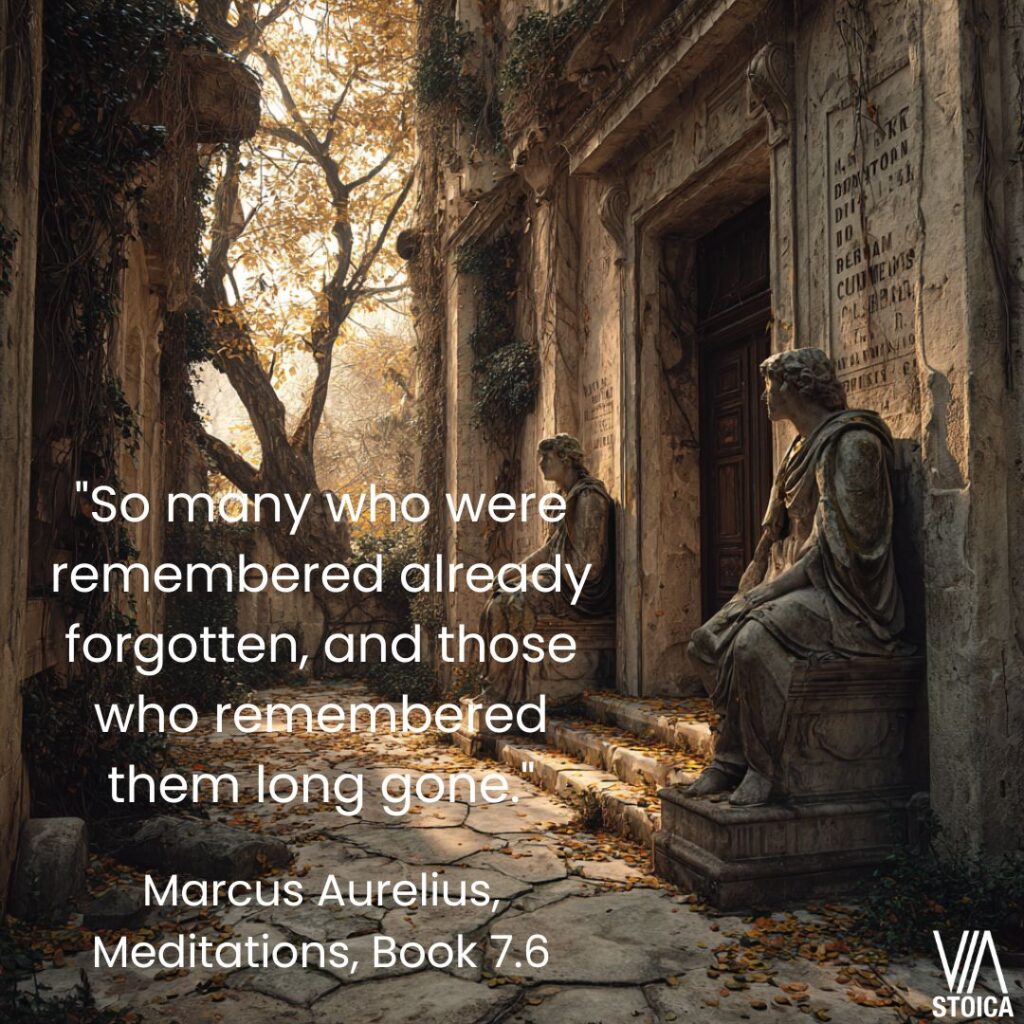
Reflection:
We never lose as much as we think we do, yet we lose it all. What do we lose? This moment. And every snapshot of life that is gone can be seen as a mini-death. That version of me and of the world is gone, never to come back.
This is one reason why we should be able to deal with death better than we tend to do because we experience it all the time. Learn to see the change for what it is, a practice in dying. And see the present as a practice in living.
Practice:
Ask yourself every hour: What have I said goodbye to?
- Death Is Neither Good Nor Bad
“Death and life, success and failure, pain and pleasure, wealth and poverty, all these happen to good and bad alike, and they are neither noble nor shameful – and hence neither good or bad.”
Marcus Aurelius, Meditations, Book 2.11
Reflection:
As we end these 20 Marcus Aurelius quotes on death, we need to accept the fact that this will happen to everyone. Those who lived well and those who lived badly. There is no difference at the end; we will all meet the same fate. But how we meet it is up to us, and how well we live and as the Stoics say, hand over our soul to the Logos, is our responsibility.
There is no need to label death as a good or bad thing because it is natural. It is a part of nature and thus in accordance with reason and logic. If we meet our end with virtue, we will meet it with joy, one of the good emotions, the Eupatheiai. And this is how the Stoic sage can be joyous even on the rack.
Practice:
When facing something hard today, ask: Am I labeling this as good or bad, or am I judging it wisely?
Conclusion: Death, the Greatest Reminder
Marcus Aurelius didn’t see death as the end. He saw it as the great equalizer, the most powerful mirror, and the ultimate reminder to live. Every day you avoid thinking about death is a day you might avoid living fully. The goal is not to be morbid but to be awake. To instill gratitude and attention to the present moment.
Journaling prompt:
What would I do differently if I truly accepted that I could leave life right now?
Book a free consultation with one of our Stoic Coaches to get support.
Or read more Marcus Aurelius quotes on our Stoic Quotes page.
Listen to the Via Stoica Podcast on Spotify, Apple Podcasts, or YouTube.
Frequently Asked Questions
What did Marcus Aurelius say about death?
Marcus Aurelius believed death was a natural part of life, not something to be feared. In Meditations, he writes, “You could leave life right now. Let that determine what you do and say and think.” He saw death as a reminder to live with virtue and presence.
What is the Stoic view on death?
Stoics see death as neither good nor bad. It is a natural event that lies outside our control. What matters is how we live before death and how we face it, with acceptance, peace, and virtue. Death is part of nature’s design, not something to resist.
Why did Marcus Aurelius write so much about death?
Meditations was Marcus Aurelius’ personal journal. He often wrote about death as a way to strengthen his character and reduce fear. Reminding himself of life’s brevity helped him focus on what truly mattered: virtue, duty, and reason.
Is “You could leave life right now” really from Marcus Aurelius?
Yes. The quote “You could leave life right now. Let that determine what you do and say and think.” comes from Meditations, Book 2.11. It reflects the Stoic practice of memento mori, remembering death to live wisely.
How can I apply Stoic teachings on death in daily life?
You can reflect on death regularly, practice gratitude for the present moment, and focus on living with intention. Stoics recommend journaling, meditating on mortality, and reminding yourself that only the present is yours to shape.
Related Posts
-
 Greek Stoic Philosophy Terms
Greek Stoic Philosophy TermsWhat Is Ekklisis? The Stoic Art of Avoiding What Harms Your Character
What Is Ekklisis? Ekklisis in Stoicism is the rational refusal to engage with what would damage one’s moral choice. The Stoic meaning of ekklisis is important because it teaches us what to turn away from, not out of fear, but out of commitment to living well. In daily life, ekklisis helps us step back from […]
Read more -
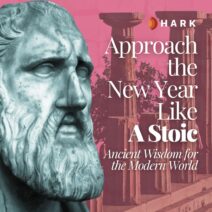 Via Stoica Podcast
Via Stoica PodcastA Hark Audio Curated Stoic Playlist for 2026
At the start of a new year, there is often an unspoken promise that things will somehow be different. Calmer. More ordered. More predictable. Yet life rarely follows that script. Delays disrupt flights, plans break down, people drift away, and life brings events we cannot control. What we can work on, and what Stoicism has […]
Read more -
 Book Reviews
Book ReviewsThe Stoic Leader by John Sellars and Justin Stead
The Stoic Leader introduces Stoicism as a practical philosophy and explores how its principles shape leadership, judgment, and character in both work and life. Summary Written by John Sellars and Justin Stead, The Stoic Leader offers what is effectively two books in one. Sellars provides an introduction to Stoicism and its philosophical foundations, while Stead […]
Read more


Comments 0